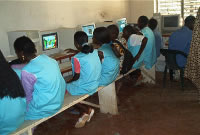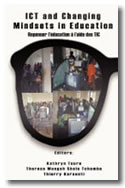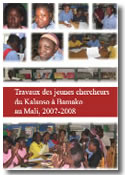“ERNWACA ICT project intends to make information and communication technologies the principal tool used to improve the quality of education”, according to regional coordinator Kathryn Toure July 27, 2007
Dakar — In the poor fishing neighbourhood of Medina in the Senegalese capital, Dakar, a small school sits wedged between a run-down cemetery and a craft market. Piles of rubbish line a sandy alleyway that leads to the school’s front gate. The school walls are stained; desks are cracked and dusty.
wedged between a run-down cemetery and a craft market. Piles of rubbish line a sandy alleyway that leads to the school’s front gate. The school walls are stained; desks are cracked and dusty.
Yet among the dirt and disorder of one classroom, six shiny flat-screen computers line one side. They are seemingly out of place.
At one computer ten-year-old Amadou Diallo is fighting off his classmates to be the one to turn it on.
Amadou is in grade 4, and had never used a computer until 10 appeared in his elementary school library. Now, he uses a computer five hours a week.
As more and more computers fill African schools, a debate has centred around the role technology should play in development. On the one hand, proponents argue information and communication technologies are necessary to help bring Africa into the 21st century and out of poverty. But critics say resources could be better spent elsewhere, especially given the costs of training, maintenance and disposal of the machines in an environmentally friendly way.
“Digital technology is the hope for Africa,” Senegalese President Abbdoulaye Wade declared on 18 July, as he invited his people to consider the education system through the lens of “making the Senegal of tomorrow”.
He said information and communication technologies facilitated the possibilities of innovation in education. The president said he hoped at least every student and every teacher could have access to a computer.
That process has already begun. Amadou’s school, Serigne Amadou Aly Mbaye primary school, is conducting a unique pilot project with the Senegalese Ministry of Education. The Canadian government’s International Research and Development Centre (IDRC) has funded the installation of 34 computers in four of the school’s classrooms and in its library.
Researchers from the Ministry of Education’s Institut national d’étude et d’action pour le développement de l’éducation (INEADE – a government affiliated institute for the development of education) have been studying how information and communication technologies can be integrated into teaching – with proper support and monitoring. They will report back to the ministry later this year with the goal of spreading good technology-based teaching to primary schools across Senegal.
A less thorough examination is also being conducted in other schools in Senegal and across West Africa by the non profit association Educational Research Network for West And Central Africa (ROCARÉ) “to make information and communication technologies the principal tool used to improve the quality of education,” according to regional coordinator Kathryn Toure.
A question of priorities
While all signs point to more movement towards technology in African schools, some people both within and outside of Africa are questioning whether it is the right approach.
In 2005, at the launch of the UN-backed US$100 laptop – an innovation designed to be cheap, light, not reliant on mains electricity and distributable to poor African school-age children – critics argued the children had more pressing basic needs: that they would be better off with clean water and proper schools than computers.
“Is being able to type up a resume in Word really more crucial than being able to eat for a day or receive life-saving medicines? Will a sea of cheap laptops really make a difference in the world’s poorest regions?” technology and policy writer Timothy Sprinkle wrote in a September 2006 World Politics Review article.
In Senegal, only 39 percent of people over 15 years old are literate; 38 percent of children are in school; and 63 percent of the population lives on under $2 dollars a day, according to the latest UN Human Development Index.
“The question is not so much ‘Can computers make a difference?’” George Roter, co-founder of the Canadian organization Engineers Without Borders, told IRIN. “The bigger question is…’What are the bottlenecks to a child getting an education?’ The natural answer is not that there aren’t enough computers.”
In rural African villages, barriers to education are “less sexy” issues, such as retention of quality teachers and malnutrition among children, Roter said, adding that resources should be prioritized accordingly.
Other concerns include the training of teachers, how computers would be disposed of, and the costs involved with maintenance.
A 2002 study by the World Bank Human Development Network and the UK Department for International Development (DfID) found that the total cost of ensuring effective computer learning in secondary schools in developing countries could well be around five times the cost of the computer equipment itself.
Challenges
Even in its urban setting, the Serigne Amadou Aly Mbaye school faces challenges every day with its computer project.
Some of the older teachers are resistant to change and refuse to take part. Kids huddle around the computers, sitting two or three to a chair, as there is only one computer for every six children. Also, because of an unreliable power supply, every time all six computers are turned on at once, a loud beeping noise starts up and three of the computers often shut down.
“Sometimes”, school director Cheikh Sylla told IRIN, “you prepare your lesson, with internet and video-projection, then the electricity cuts. You become totally disabled.”
Still, those involved in the project say African students must not and need not allow poverty and underdevelopment to limit their options.
“There is little doubt that sub-Saharan Africa’s underserved populations are missing out on the boons of information and communication technology,” the Canadian sponsor IDRC wrote on its website.
“Even if they’re poor, they have to evolve with the world,” grade 3 teacher Ndickou Diop Ndaw said of her students. She questioned how students would conduct research at university level and how they would keep up with others if they did not know how to use computers.
“Being poor doesn’t mean being poor in knowledge too.”
There’s no sense in waiting for the continent to develop further before embracing technology, added school director Sylla. In fact, he said, embracing technology will lead to more development.
“It can open doors,” added researcher Papa Amadou Sène of INEADE. “It can pull people out of poverty.”
Motivated students
Teachers at the Serigne Amadou Aly Mbaye school have been using computers in some classrooms since 2003 to do maths problems, French vocabulary exercises, research projects, and geometry tracing.
They say it allows students to instantly see their mistakes, and correct their work themselves, and also motivates students to work harder. Tools like video-projection create moving, life-size images that allow students to experience the feel and atmosphere of places they could only read about in books.
“The students invest themselves more because it’s interesting for them,” school director Sylla said. “There are things to discover.”
Absences are down. Results are up. In the director’s office sits a trophy the students won at a regional learning contest, where they made it to the semi-finals last year.
“It’s thanks to the internet that the students have access to extraordinary resources that have hugely opened doors to knowledge,” Sylla said.
Children already have access to computers through the scores of internet cafes that line the streets of Dakar. Sylla said it was important they use the machines in an educational setting as well.
“They’ll listen to music, look at pornographic sites and chat,” Sylla said. “Children who don’t have the internet at school will think that that’s all the internet is good for.”
An increasing number of elementary schools in Senegal are seeing technology enter their classrooms. Of close to 7,000 elementary schools in Senegal, 231 declared having at least one computer in a survey of schools in Dakar, St. Louis and Thies, according to INEADE’s Sène.
Sène said the government is in the process of distributing 30,000 computers to elementary schools, starting in Dakar. He added the government has already made 100,000 orders for the $100 laptop.
Source: All Africa
Copyright © 2007 UN Integrated Regional Information Networks. All rights reserved. Distributed by AllAfrica Global Media (allAfrica.com).



Leave a Reply